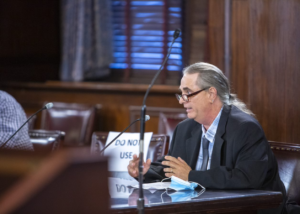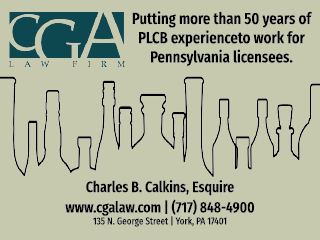PLBTA Testimony: Gaming In Taverns
 The following testimony was provided on March 26, 2024, by Jim DeLisio in front of the Pennsylvania House Republican Policy Committee. Mr. DeLisio is vice president of the Pennsylvania Licensed Beverage and Tavern Association and president of the York County Tavern Association. He is the owner of the Race Horse Tavern in Thomasville, Pa.
The following testimony was provided on March 26, 2024, by Jim DeLisio in front of the Pennsylvania House Republican Policy Committee. Mr. DeLisio is vice president of the Pennsylvania Licensed Beverage and Tavern Association and president of the York County Tavern Association. He is the owner of the Race Horse Tavern in Thomasville, Pa.
Chairman Kail, Representative Diamond, members of the Committee, good morning. I’m Jim DeLisio, owner of the Race Horse Tavern in Thomasville, York County. I’m also Vice President of the Pennsylvania Licensed Beverage and Tavern Association as well as President of the York County Tavern Association.
With me is Chuck Moran, executive director of the Pennsylvania Licensed Beverage and Tavern Association. Chuck will be available to help answer questions afterwards.
Let me begin by thanking you for inviting the Pennsylvania Licensed Beverage and Tavern Association to testify today. In the past I’ve enjoyed speaking with this committee on other issues so I’m humbled to be invited back.
Today, we’ll be talking about gaming in taverns with an emphasis on skill games. Gaming in general is a topic that I’ve testified in front of other committees in recent years, and I want everyone here to know that my establishment is one of a few Pennsylvania bars that has an active tavern gaming license. In fact, a license search conducted on March 11, 2024, shows there are only 39 of us with one.
For the sake of comparison, the most recent annual report from the PLCB shows there are slightly more than 11,200 R and H licensees in the state that could be eligible for a tavern gaming license. If you do the math, that’s about one-third of one percent.
As background, the Pennsylvania Licensed Beverage and Tavern Association was established in 1941 and today represents small business bars, taverns, and licensed restaurants throughout the state. Our perspective comes from the so-called “mom-and-pop” businesses that own either an R, H, or E liquor license. For the most part, we are your local bars, taverns, pubs, and licensed restaurants. We do not actively recruit large chains, grocery stores, or convenience stores that have R licenses.
Based on past Membership studies, about 63 percent of our member’s business is alcohol sales and 37% of sales are from food. Our average member employs about 16 individuals including the owner and family members. They serve less than 4,000 customers every month. If you count the chairs and barstools, throughout my Member establishments, you’ll find less than 100 per establishment.
The Tavern Association has a general position on gaming. We believe our Members should be allowed to offer legal forms of gaming in their establishments to entertain their patrons. That extends from tavern gaming to any other forms of gambling, including VGTs and video skill games.
As you know, small business bars have been hit hard for about the past 8 years. Our financial struggles began in 2017 when Act 166 of 2016 officially went into effect. That act stole an exclusive right that bar owners had … the right to sell six-packs and growlers to go. Act 166 gave beer distributors the right to sell to consumers any amount including amounts below a case down to a growler.
That in combination with other alcohol sale changes through Act 39 drove a stake through the heart of small business bars. Our membership studies show that during that time, 85 percent of our Members saw a decrease in beer sales. And, 30 percent of our Members saw a decrease between 11 and 20 percent. That adds up to thousands of dollars in lost revenue.
Clearly, small business bars became collateral damage of Acts 39 and 166.
We know that was not the intent of the legislature when it passed those bills and Governor Wolf signed them into law. But, you need to know that past legislative actions seriously damaged many small business bars across the state and we hope to work with you to correct the situation.
With revenue dropping as a result of those Acts, bar owners began to look at other options to fill their income void and stay profitable. Bars were locked out of the opportunity to have VGTs in their establishments when truck stops got them. So VGTs were not a legal option, although we wish they were.
That’s when video skill gaming entered the picture – and at least for now, court decisions have declared them not to be slot machines.
I can’t tell you how many skill games are in Pennsylvania bars at this time. That data is not something we collect. Businesses that sell and distribute skill games should have data on how many they’ve put into Pennsylvania.
But I can tell you based upon conversations I’ve had with colleagues at other establishments and across the state, skill games filled at least part of the void. Those with skill games are using the profits to pay bills, upgrade establishments to compete with newer license types, or offer benefits to employees.
We certainly hope this legislature will take action soon to finally put to bed the debate on whether or not skill games are legal, and whether skill games and VGTs should be in Pennsylvania bars. We do, however, need to remember lessons from the past including those from tavern gaming and the current situation with skill games.
First, tavern gaming did not take off and the state did not generate the revenue that it had projected. As mentioned earlier a shockingly low number of licensed establishments chose to offer tavern gaming. Why? There’s little profit after taxes and payment of supplies. I can talk more about that during the Q&A.
Any legislation that you would write to allow skill games and VGTs in bars would need to be careful not to carry a high tax. Also there can’t be a small cut for the bars.
Second, the current distribution of skill games is questionable. Unlike VGTs in truck stops that are regulated and monitored, skill game distributors have put their machines in locations that are easily accessible to anyone including minors.
There are also issues related to security and safety of some locations where these machines have been placed. You probably saw recent news articles out of Philadelphia that indicate the city has taken initial steps to ban skill games. Apparently, players have been robbed after winning.
I’ll conclude by thanking you for the opportunity to represent small business bars, taverns and licensed restaurants today. Chuck and I will be happy to answer any questions you may have at this time and in the future.






